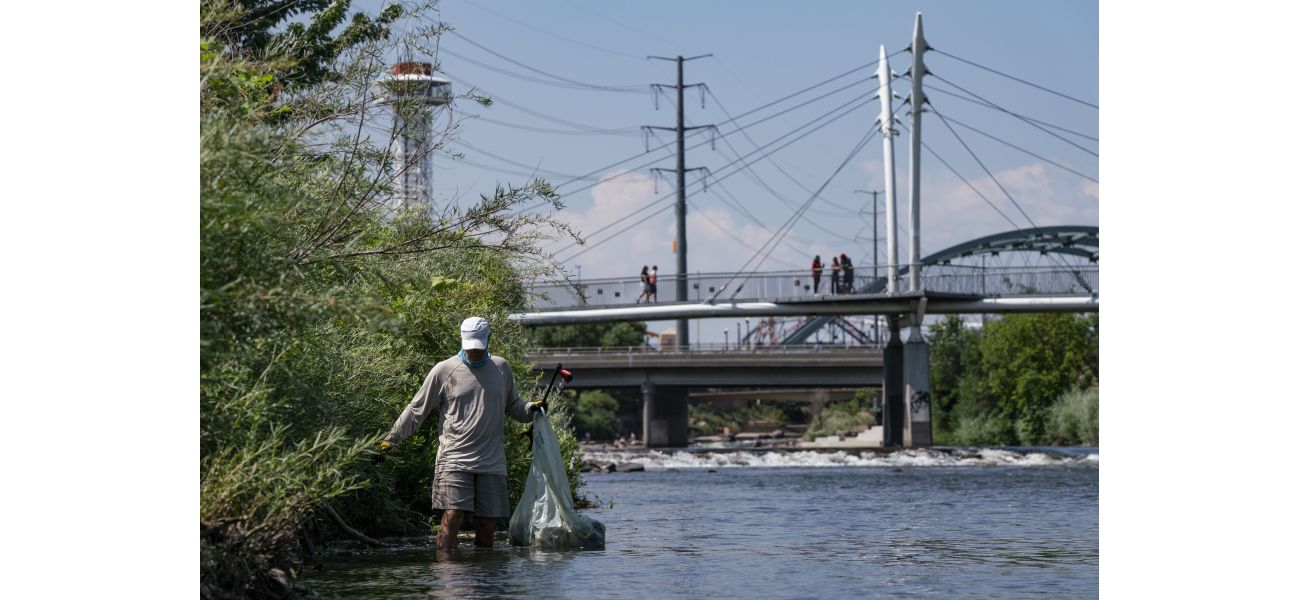Denver's South Platte River remains unsuitable for swimming due to various challenges in improving its water quality.
Denver's South Platte River has gained attention for its environmental issues, emphasizing the ongoing challenges with water quality.
September 8th 2024.

Volunteers who are dedicated to keeping Denver's South Platte River clean have encountered a diverse array of discarded items along its banks. From shopping carts to food wrappers, even guns and outdated car phones from the 1990s have been found. Despite efforts to revitalize the river and develop its surrounding areas, the water quality often falls below state standards. In fact, certain parts of the South Platte still emit an unpleasant odor. Former Denver Mayor Michael Hancock had promised to make the river swimmable, but city health officials still caution against entering the water, especially during the summer months. Jon Novick, the administrator of Denver's Department of Public Health and Environment's water quality program, advises people to opt for swimming pools instead, as they are much safer.
The recent surge of attention on the South Platte, from both developers and community leaders, as well as city officials, has shed light on the various environmental challenges that still exist. Despite the efforts being made, there are still significant issues that need to be addressed. For instance, wastewater plants continue to release effluent into the river, and companies such as Suncor Energy are responsible for releasing a range of substances into the South Platte and its tributaries. This includes inorganic nitrogen, arsenic, and the class of PFAS compounds known as "forever chemicals."
For decades, Denver's health department has been monitoring the conditions of the river, including its temperature, acidity, nutrients, and metals. However, their primary concern is the presence of E. coli bacteria. Novick explains that E. coli can cause infections or make people sick if ingested, and it can enter the water through animal or human waste. Due to the city's aging infrastructure, there are instances where sewage from wastewater pipes leaks and eventually ends up in the river. Additionally, all of the city's stormwater eventually flows into the South Platte. The bacteria tends to spread more rapidly in the warmer waters of summer, which is when people are most likely to want to swim. As the river flows downstream to the north, the concentration of E. coli increases.
According to the most recent water quality report published by the DDPHE last October, the South Platte's water quality is rated as "fair," which falls between "marginal" and "poor," but is still below "good." In 2022, E. coli levels exceeded the Colorado Water Quality Control Commission's standard year-round. The river also exceeded standards for arsenic, a naturally occurring substance found in the bedrock under the city.
The South Platte River suffers from the effects of the millions of people who live nearby. Anything that is not picked up or blown away from Denver's streets and sidewalks eventually makes its way into the river. This includes trash, lawn fertilizers, runoff from roads, pet waste, and oil and grease from vehicles. The Mile High Flood District's purpose is to assist local governments in improving stormwater filtration before it reaches the river. This organization, which was founded after the devastating 1965 flood in Denver, has noted some positive trends in the river's health. Holly Piza, the district's director of research and development, explains that nutrients such as phosphorus and nitrogen have generally decreased. These nutrients, often found in fertilizers, can cause algae blooms and harm aquatic ecosystems. However, there are other water quality issues that are worsening, such as salinity, which can damage infrastructure and harm aquatic life.
To combat these issues, bioretention ponds have been installed outside the Carla Madison Recreation Center on Colfax Avenue. These ponds help to retain water after rainfall and filter it through the soil, rather than allowing it to flow directly into the river. Novick and Piza encourage Denver residents to be more mindful of their actions, such as using fertilizers without phosphorus or nitrogen, avoiding littering, and washing cars at a car wash instead of on the street. They also emphasize the importance of ensuring that sprinklers are watering grass, not pavement.
Novick acknowledges that the city is taking steps to improve water quality, but there is still much more that needs to be done. He urges people to stay informed and be mindful of their actions, as the responsibility to protect the South Platte ultimately falls on the community. Stay updated on all things Colorado by signing up for our Mile High Roundup email newsletter.
The recent surge of attention on the South Platte, from both developers and community leaders, as well as city officials, has shed light on the various environmental challenges that still exist. Despite the efforts being made, there are still significant issues that need to be addressed. For instance, wastewater plants continue to release effluent into the river, and companies such as Suncor Energy are responsible for releasing a range of substances into the South Platte and its tributaries. This includes inorganic nitrogen, arsenic, and the class of PFAS compounds known as "forever chemicals."
For decades, Denver's health department has been monitoring the conditions of the river, including its temperature, acidity, nutrients, and metals. However, their primary concern is the presence of E. coli bacteria. Novick explains that E. coli can cause infections or make people sick if ingested, and it can enter the water through animal or human waste. Due to the city's aging infrastructure, there are instances where sewage from wastewater pipes leaks and eventually ends up in the river. Additionally, all of the city's stormwater eventually flows into the South Platte. The bacteria tends to spread more rapidly in the warmer waters of summer, which is when people are most likely to want to swim. As the river flows downstream to the north, the concentration of E. coli increases.
According to the most recent water quality report published by the DDPHE last October, the South Platte's water quality is rated as "fair," which falls between "marginal" and "poor," but is still below "good." In 2022, E. coli levels exceeded the Colorado Water Quality Control Commission's standard year-round. The river also exceeded standards for arsenic, a naturally occurring substance found in the bedrock under the city.
The South Platte River suffers from the effects of the millions of people who live nearby. Anything that is not picked up or blown away from Denver's streets and sidewalks eventually makes its way into the river. This includes trash, lawn fertilizers, runoff from roads, pet waste, and oil and grease from vehicles. The Mile High Flood District's purpose is to assist local governments in improving stormwater filtration before it reaches the river. This organization, which was founded after the devastating 1965 flood in Denver, has noted some positive trends in the river's health. Holly Piza, the district's director of research and development, explains that nutrients such as phosphorus and nitrogen have generally decreased. These nutrients, often found in fertilizers, can cause algae blooms and harm aquatic ecosystems. However, there are other water quality issues that are worsening, such as salinity, which can damage infrastructure and harm aquatic life.
To combat these issues, bioretention ponds have been installed outside the Carla Madison Recreation Center on Colfax Avenue. These ponds help to retain water after rainfall and filter it through the soil, rather than allowing it to flow directly into the river. Novick and Piza encourage Denver residents to be more mindful of their actions, such as using fertilizers without phosphorus or nitrogen, avoiding littering, and washing cars at a car wash instead of on the street. They also emphasize the importance of ensuring that sprinklers are watering grass, not pavement.
Novick acknowledges that the city is taking steps to improve water quality, but there is still much more that needs to be done. He urges people to stay informed and be mindful of their actions, as the responsibility to protect the South Platte ultimately falls on the community. Stay updated on all things Colorado by signing up for our Mile High Roundup email newsletter.
[This article has been trending online recently and has been generated with AI. Your feed is customized.]
[Generative AI is experimental.]
0
0
Submit Comment





